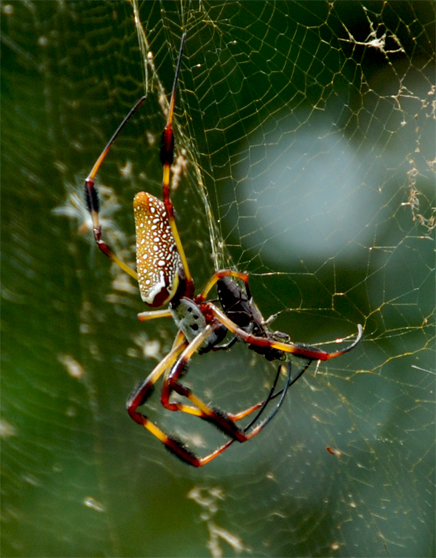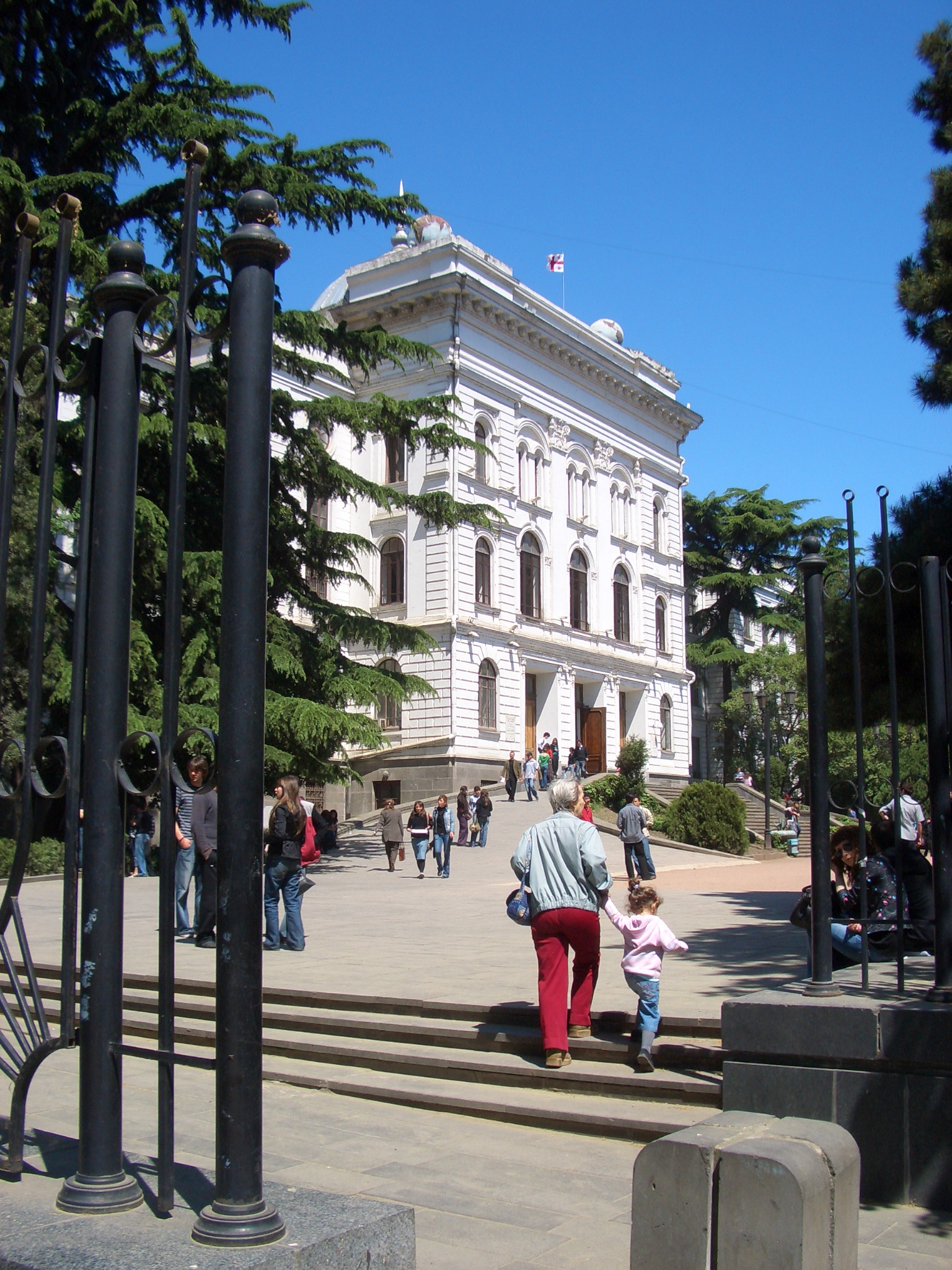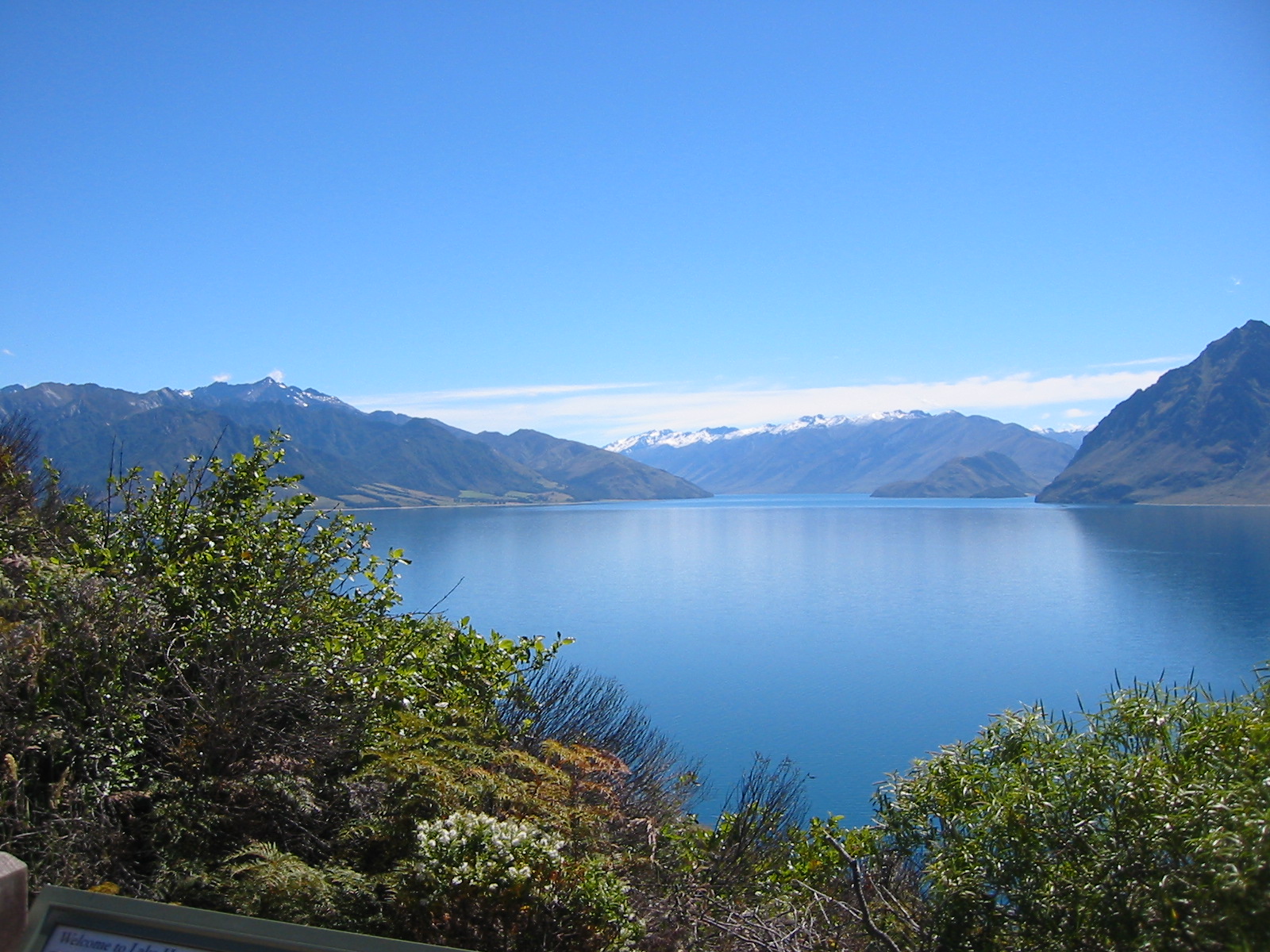|
Tamara Mkheidze
Tamara Mkheidze ( ka, თამარ მხეიძე; December 22, 1915, Kutaisi – April 11, 2007, Tbilisi) was a Georgian arachnologist. Life Tamara Mkheidze grew up in Kutaisi ( Georgia) and later studied zoology at the Tbilisi State University. She worked there as a lecturer until 1990 and was active after that as an arachnologist. She was married to the limnologist Lavrosi Kutubidze. Activities Tamara Mkheidze was the first arachnologist from the Caucasus region. Her main research dealt with the arachnofauna of her homeland Georgia. In her more than thirty publications she described more than forty new species of spiders and harvestmen. Publications * Mkheidze T. S. (1941). A study on spiders distributed in Georgia. - Proceeding of the Tbilisi State University, 21: 99-104. n Georgian N, or n, is the fourteenth letter in the Latin alphabet, used in the modern English alphabet, the alphabets of other western European languages and others worldwide. ... [...More Info...] [...Related Items...] OR: [Wikipedia] [Google] [Baidu] |
Kutaisi
Kutaisi (, ka, ქუთაისი ) is one of the oldest continuously inhabited cities in the world and the third-most populous city in Georgia, traditionally, second in importance, after the capital city of Tbilisi. Situated west of Tbilisi, on the Rioni River, it is the capital of the western region of Imereti. Historically one of the major cities of Georgia, it served as political center of Colchis in the Middle Ages as capital of the Kingdom of Abkhazia and Kingdom of Georgia and later as the capital of the Kingdom of Imereti. From October 2012 to December 2018, Kutaisi was the seat of the Parliament of Georgia as an effort to decentralise the Georgian government. History Archaeological evidence indicates that the city functioned as the capital of the Colchis in the sixth to fifth centuries BC. It is believed that, in ''Argonautica'', a Greek epic poem about Jason and the Argonauts and their journey to Colchis, author Apollonius Rhodius considered Kutaisi their final d ... [...More Info...] [...Related Items...] OR: [Wikipedia] [Google] [Baidu] |
Tbilisi
Tbilisi ( ; ka, თბილისი ), in some languages still known by its pre-1936 name Tiflis ( ), is the Capital city, capital and the List of cities and towns in Georgia (country), largest city of Georgia (country), Georgia, lying on the banks of the Kura (Caspian Sea), Kura River with a population of approximately 1.5 million people. Tbilisi was founded in the 5th century Anno Domini, AD by Vakhtang I of Iberia, and since then has served as the capital of various Georgian kingdoms and republics. Between 1801 and 1917, then part of the Russian Empire, Tiflis was the seat of the Caucasus Viceroyalty (1801–1917), Caucasus Viceroyalty, governing both the North Caucasus, northern and the Transcaucasia, southern parts of the Caucasus. Because of its location on the crossroads between Europe and Asia, and its proximity to the lucrative Silk Road, throughout history Tbilisi was a point of contention among various global powers. The city's location to this day ensures its p ... [...More Info...] [...Related Items...] OR: [Wikipedia] [Google] [Baidu] |
Arachnology
Arachnology is the scientific study of arachnids, which comprise spiders and related invertebrates such as scorpions, pseudoscorpions, and harvestmen. Those who study spiders and other arachnids are arachnologists. More narrowly, the study of spiders alone ( order Araneae) is known as araneology. The word "arachnology" derives from Greek , ''arachnē'', "spider"; and , ''-logia'', "the study of a particular subject". Arachnology as a science Arachnologists are primarily responsible for classifying arachnids and studying aspects of their biology. In the popular imagination, they are sometimes referred to as spider experts. Disciplines within arachnology include naming species and determining their evolutionary relationships to one another (taxonomy and systematics), studying how they interact with other members of their species and/or their environment (behavioural ecology), or how they are distributed in different regions and habitats (faunistics). Other arachnologists perform ... [...More Info...] [...Related Items...] OR: [Wikipedia] [Google] [Baidu] |
Georgia (country)
Georgia (, ; ) is a transcontinental country at the intersection of Eastern Europe and Western Asia. It is part of the Caucasus region, bounded by the Black Sea to the west, by Russia to the north and northeast, by Turkey to the southwest, by Armenia to the south, and by Azerbaijan to the southeast. The country covers an area of , and has a population of 3.7 million people. Tbilisi is its capital as well as its largest city, home to roughly a third of the Georgian population. During the classical era, several independent kingdoms became established in what is now Georgia, such as Colchis and Iberia. In the early 4th century, ethnic Georgians officially adopted Christianity, which contributed to the spiritual and political unification of the early Georgian states. In the Middle Ages, the unified Kingdom of Georgia emerged and reached its Golden Age during the reign of King David IV and Queen Tamar in the 12th and early 13th centuries. Thereafter, the kingdom decl ... [...More Info...] [...Related Items...] OR: [Wikipedia] [Google] [Baidu] |
Zoology
Zoology ()The pronunciation of zoology as is usually regarded as nonstandard, though it is not uncommon. is the branch of biology that studies the Animal, animal kingdom, including the anatomy, structure, embryology, evolution, Biological classification, classification, Ethology, habits, and distribution of all animals, both living and extinction, extinct, and how they interact with their ecosystems. The term is derived from Ancient Greek , ('animal'), and , ('knowledge', 'study'). Although humans have always been interested in the natural history of the animals they saw around them, and made use of this knowledge to domesticate certain species, the formal study of zoology can be said to have originated with Aristotle. He viewed animals as living organisms, studied their structure and development, and considered their adaptations to their surroundings and the function of their parts. The Greek physician Galen studied human anatomy and was one of the greatest surgeons of the a ... [...More Info...] [...Related Items...] OR: [Wikipedia] [Google] [Baidu] |
Tbilisi State University
Ivane Javakhishvili Tbilisi State University ( ka, ივანე ჯავახიშვილის სახელობის თბილისის სახელმწიფო უნივერსიტეტი ''Ivane Javaxishvilis saxelobis Tbilisis saxelmts'ipo universit'et'i'', often shortened to its historical name, Tbilisi State University or TSU) is a public research university established on 8 February 1918 in Tbilisi, Georgia. Excluding academies and theological seminaries, which have intermittently functioned in Georgia for centuries, TSU is the oldest university in Georgia and the Caucasus region. Over 23 500 students are enrolled and the total number of faculty and staff (collaborators) is 5,000. According to the U.S. News & World Report university rankings, TSU is ranked 398th in the world, tied with the University of Warsaw. The university has five branches in the regions of Georgia, six faculties, 60 scientific-research laboratories and centers, a ... [...More Info...] [...Related Items...] OR: [Wikipedia] [Google] [Baidu] |
Limnology
Limnology ( ; from Greek λίμνη, ''limne'', "lake" and λόγος, ''logos'', "knowledge") is the study of inland aquatic ecosystems. The study of limnology includes aspects of the biological, chemical, physical, and geological characteristics of fresh and saline, natural and man-made bodies of water. This includes the study of lakes, reservoirs, ponds, rivers, springs, streams, wetlands, and groundwater.Wetzel, R.G. 2001. Limnology: Lake and River Ecosystems, 3rd ed. Academic Press () Water systems are often categorized as either running (lotic) or standing (lentic). Limnology includes the study of the drainage basin, movement of water through the basin and biogeochemical changes that occur en route. A more recent sub-discipline of limnology, termed landscape limnology, studies, manages, and seeks to conserve these ecosystems using a landscape perspective, by explicitly examining connections between an aquatic ecosystem and its drainage basin. Recently, the need to underst ... [...More Info...] [...Related Items...] OR: [Wikipedia] [Google] [Baidu] |
Caucasus
The Caucasus () or Caucasia (), is a region between the Black Sea and the Caspian Sea, mainly comprising Armenia, Azerbaijan, Georgia, and parts of Southern Russia. The Caucasus Mountains, including the Greater Caucasus range, have historically been considered as a natural barrier between Eastern Europe and Western Asia. Mount Elbrus in Russia, Europe's highest mountain, is situated in the Western Caucasus. On the southern side, the Lesser Caucasus includes the Javakheti Plateau and the Armenian highlands, part of which is in Turkey. The Caucasus is divided into the North Caucasus and South Caucasus, although the Western Caucasus also exists as a distinct geographic space within the North Caucasus. The Greater Caucasus mountain range in the north is mostly shared by Russia and Georgia as well as the northernmost parts of Azerbaijan. The Lesser Caucasus mountain range in the south is occupied by several independent states, mostly by Armenia, Azerbaijan, and Georgia, but also ... [...More Info...] [...Related Items...] OR: [Wikipedia] [Google] [Baidu] |
Spider
Spiders ( order Araneae) are air-breathing arthropods that have eight legs, chelicerae with fangs generally able to inject venom, and spinnerets that extrude silk. They are the largest order of arachnids and rank seventh in total species diversity among all orders of organisms. Spiders are found worldwide on every continent except for Antarctica, and have become established in nearly every land habitat. , 50,356 spider species in 132 families have been recorded by taxonomists. However, there has been debate among scientists about how families should be classified, with over 20 different classifications proposed since 1900. Anatomically, spiders (as with all arachnids) differ from other arthropods in that the usual body segments are fused into two tagmata, the cephalothorax or prosoma, and the opisthosoma, or abdomen, and joined by a small, cylindrical pedicel, however, as there is currently neither paleontological nor embryological evidence that spiders ever had ... [...More Info...] [...Related Items...] OR: [Wikipedia] [Google] [Baidu] |
Opiliones
The Opiliones (formerly Phalangida) are an order of arachnids colloquially known as harvestmen, harvesters, harvest spiders, or daddy longlegs. , over 6,650 species of harvestmen have been discovered worldwide, although the total number of extant species may exceed 10,000. The order Opiliones includes five suborders: Cyphophthalmi, Eupnoi, Dyspnoi, Laniatores, and Tetrophthalmi, which were named in 2014. Representatives of each extant suborder can be found on all continents except Antarctica. Well-preserved fossils have been found in the 400-million-year-old Rhynie cherts of Scotland, and 305-million-year-old rocks in France. These fossils look surprisingly modern, indicating that their basic body shape developed very early on, and, at least in some taxa, has changed little since that time. Their phylogenetic position within the Arachnida is disputed; their closest relatives may be the mites (Acari) or the Novogenuata (the Scorpiones, Pseudoscorpiones, and Solifugae). Althou ... [...More Info...] [...Related Items...] OR: [Wikipedia] [Google] [Baidu] |
1915 Births
Events Below, the events of World War I have the "WWI" prefix. January * January – British physicist Sir Joseph Larmor publishes his observations on "The Influence of Local Atmospheric Cooling on Astronomical Refraction". *January 1 ** WWI: British Royal Navy battleship HMS ''Formidable'' is sunk off Lyme Regis, Dorset, England, by an Imperial German Navy U-boat, with the loss of 547 crew. ** Battle of Broken Hill: A train ambush near Broken Hill, New South Wales, Australia, is carried out by two men (claiming to be in support of the Ottoman Empire) who are killed, together with 4 civilians. * January 5 – Joseph E. Carberry sets an altitude record of , carrying Capt. Benjamin Delahauf Foulois as a passenger, in a fixed-wing aircraft. * January 12 ** The United States House of Representatives rejects a proposal to give women the right to vote. ** '' A Fool There Was'' premières in the United States, starring Theda Bara as a '' femme fatale''; she quickly become ... [...More Info...] [...Related Items...] OR: [Wikipedia] [Google] [Baidu] |
2007 Deaths
This is a list of deaths of notable people, organised by year. New deaths articles are added to their respective month (e.g., Deaths in ) and then linked here. 2022 2021 2020 2019 2018 2017 2016 2015 2014 2013 2012 2011 2010 2009 2008 2007 2006 2005 2004 2003 2002 2001 2000 1999 1998 1997 1996 1995 1994 1993 1992 1991 1990 1989 1988 1987 See also * Lists of deaths by day The following pages, corresponding to the Gregorian calendar, list the historical events, births, deaths, and holidays and observances of the specified day of the year: Footnotes See also * Leap year * List of calendars * List of non-standard ... * Deaths by year {{DEFAULTSORT:deaths by year ... [...More Info...] [...Related Items...] OR: [Wikipedia] [Google] [Baidu] |






.jpg)
